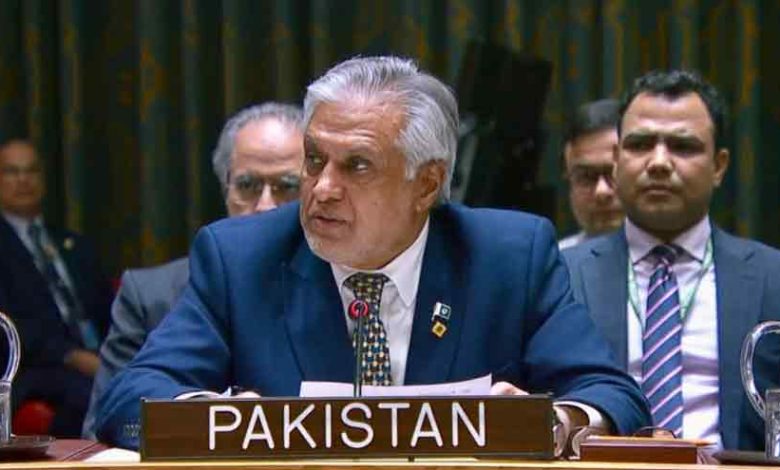Pakistan demands swift action to put an end to the violence in Gaza.

Pakistan has emphasized a two-State option for Middle East peace and called on the UN Security Council to take strong action to protect human dignity, guarantee accountability, and administer justice.
Deputy Prime Minister and Foreign Minister Senator Ishaq Dar addressed the 15-member Council on the Middle East issue, particularly in besieged Gaza, saying, “The time for words has passed; the time for action is now.”
Following the High-Level International Conference for the Peaceful Settlement of the Question of Palestine and the Implementation of the Two-State Solution on September 22, which further stoked widespread international support for the rights and sovereignty of a Palestinian State, the meeting took place.
Pakistan had the honor of being one of the first few nations to recognize Palestine after its declaration of independence in 1988, Dar said, praising the recent recognition of Palestine by many member states.
“Strong resolve, seriousness of purpose, and an unwavering commitment to achieving a just and lasting solution are necessary to sustain this positive momentum,” he stated. “The suffering of the Palestinian people is a stain on our collective consciousness, and they are facing a crisis of historic proportions.”
As he reiterated Pakistan’s steadfast support for the Palestinian people in their just struggle for dignity, justice, and self-determination through the establishment of a sovereign, independent, and contiguous Palestinian State on pre-1967 borders, with Al-Quds Al-Sharif as its capital, Dar said that Gaza has turned into a graveyard for humanity and the global conscience.
In this context, he demanded an immediate, unconditional, and permanent ceasefire; unrestricted humanitarian access to Gaza and the immediate lifting of the blockade to supply life-saving aid to those in need; an end to the forcible eviction of Palestinians from their homes while respecting refugees’ right to return; and the creation of an international safeguard.
“We are confronting one of the darkest chapters of the Israeli-Palestinian conflict,” said UN Secretary-General Antonio Guterres, who opened the debate. He pointed out that violence has only increased throughout the Occupied Palestinian Territory almost two years after the Israeli war in Gaza. According to him, the assault in Gaza City is making the already dire humanitarian situation worse by keeping residents and hostages “under relentless bombardment and deprived of food, water, electricity, and medicine.”
The UN head underlined that famine is a reality, with people suffering and uprooted on a regular basis. “The extent of human suffering cannot be adequately conveyed by describing this situation as untenable and morally and legally indefensible.” UN resolutions and international humanitarian law are still being disregarded in spite of repeated calls for a quick, permanent ceasefire, the unconditional release of all hostages, and unimpeded humanitarian access.
He cited the Israeli attack in Qatar on September 9, which violated that nation’s sovereignty and hampered efforts by Qatar, Egypt, and the United States to secure a truce and hostage release, as evidence that violence from Gaza is extending into the Occupied West Bank and other nations in the region.
He cautioned that “the viability of a two-State solution is steadily eroding,” pointing to cycles of lethal violence, especially by extremist settlers, de facto annexation, forced displacement, and unrelenting settlement development. He emphasized that “Israeli settlements are not just a political issue — they are a flagrant violation of international law,” calling Israel’s recent approval of settlement construction in the E1 area “especially alarming.”